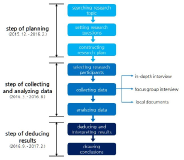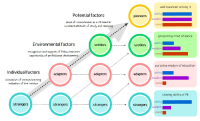Purpose This study is a phenomenological research which tries to describe the subjective experience and to analyze multi-layered meanings, and it finds out the men's training experience and meaning. The purpose of this study is to investigate why the men do Yoga and what the subjective meaning of Yoga experience, and the study examines critically whether Yoga experience especially focused on women is against gender performance and dominant body discourse. Methods For the study, 6 middle & young-old aged men who do Yoga more than 6 months every week are selected as participants. Results The meaning of Yoga for middle & young-old aged men in their lives is as follows. First, it is hard for men to experience Yoga because of social and cultural background. Finding Yoga class which takes men's membership is difficult. Second, middle & young-old aged men's physical feature(interest in their health and disease) and personal background(women friendly daily life) become specific motivation to overcome the barrier to do Yoga. Third, Yoga is 'alterative training', not a training. Yoga is considered as a training which replaces the feature of training called men's sports previously. Fourth, Yoga has a meaning of 'healing' to have our own time. Fifth, Yoga is changed by itself in Yoga culture which is focused on women even though middle & young-old aged men do Yoga for a long time. Sixth, middle & young-old aged men realize that the feature of Yoga is not 'for only women', and they thought it is 'neutral training that men can do too.' Conclusion Consequently, the reason why middle & young-old aged men do Yoga is started from the motivation regarding physical characteristics and personal background, and the main purpose is to cure and to heal our bodies and mind. For them, Yoga means 'alternative training to fit their bodies' and 'their own time'. Moreover, old male adult's training experience and meaning are against gender performance in that it cause a crack in stereotyped gender sports area, but it is notable that there is no intention to resist the dominant gender body discourse.
PURPOSE This study aimed to identify the nature of human rights violations experienced by semi-professional athletes in semi-professional sports teams and explored the relevant cases. METHODS For this purpose, 35 semi-professional athletes (20 men and 15 women) from the semi-professional sports teams participated in the study, and data collection was conducted through in-depth interviews and focus group interviews (FGI). The collected data were analyzed using the phenomenological research method proposed by Colaizzi (1978). RESULTS The study summarized the results into five categories, 14 theme clusters and 41 themes. Its inherent structures include ‘first step to becoming a semi-professional athlete: disadvantageous contracts for players,’ ‘unavoidable absolute power: obedience to the coach,’ ‘forced training camp: autonomy and privacy infringement,’ ‘structural problems of the semi-professional sports federation: tyrannized power’ and ‘female players who are in male-oriented society: gender-focused than performance.’ CONCLUSIONS The results of this study provided an understanding of athletes’ human rights violations experienced in semi-professional sports teams. Understanding athletes in semi-professional sports teams through phenomenological research was conducted based on previous studies discussing practical and policy intervention measures.

[Purpose] The purpose of this study was to explore the formation process and influential factors of professional identity for the establishment and growth of physical education(PE) teachers majoring in dance. [Methods] Based on the phenomenological research method, data from the interviews, focus group interviews, and local document were collected and analyzed from ten teachers. [Results] First, we explored the process of professional identity formation of PE teachers majoring in dance. It appeared in four stages, 'stranger,' 'adaptation,' 'settler,' and 'pioneer.' Second, we explored the factors of forming the professional identity of the PE teachers majoring in dance. The factors influencing the process of identity formation from the stranger to the adaptation were 'utilization of various training' and 'imitation of their mentor.' The factors influencing the formation process of identity formation from the adaptation to the settler were 'recognition and support of fellow teachers' and ‘opportunity of professional development.’ The factors influencing the process of identity formation from the settler to the pioneer are ‘sense of commitment as a PE teacher,’ ’constant attitude of study and learning.’ [Conclusion] The results suggest that the formation of professional identity of PE teachers majoring in dance goes through a certain stage, and the environment is important as well as the active effort and potential attitude of individual.


